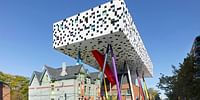- The Nuclear Engineering graduate programs encompass the nuclear power industry, from fuel manufacture to radioactive waste disposal, and the many and varied applications of radiation in industrial and medical disciplines with a strong emphasis on health physics.
- Typical workplace activities include fundamental and applied research, design and development of new equipment, systems and procedures, maintenance and modifications, commissioning and decommissioning of equipment and complete facilities, operation, analysis and regulatory affairs.
- Graduates of a master's level degree program in Nuclear Engineering must be competent in a wide range of disciplines that impinge on the safe and reliable operation of the many and varied systems that comprise radiological equipment, nuclear power plants and related facilities.
- They must understand the complex interrelationships between humans; non-human biota; and the physical, chemical, economic and social components of the environment.
- The program provides the depth and breadth of knowledge necessary for practicing professionals in nuclear engineering.
- Under the guidance of a research supervisor and a multi-disciplinary team of scientific and engineering faculty, each student has the opportunity to engage in an in-depth study of particular problems that emphasize theory and/or experimentation.
Master of Engineering [M.Eng] (Nuclear Engineering)
2 years
On Campus
English
Field of Study:
#Ranked 301 out of 1374 by THE Global Ranking 2024
CA$15,141/Yr
CA$15,141 /Yr
Important Dates
| Event | End Date |
| Application Deadline For Fall Intake | Jan 1, 2024 |
Fees & Funding
Tution & Application Fees
| Year | Year 1 | Year 2 |
| Tuition Fees | CA$15141 | CA$15141 |
| Total Fees | CA$15141 | CA$15141 |
Eligibility & Entry Requirement
Academic Eligibility:
- Hold a four-year honours degree or its equivalent from a recognized institution in the same area of graduate study or a closely related subject.
- Overall academic standing of at least a B average (GPA: 3.0 on a 4.3 scale or 73 to 76 percent), with a minimum B average in the last two full-time years (four semesters) of undergraduate work or equivalent.
Indian Eligibility:
Indian students are eligible to apply if they meet one of the following eligibility criteria:
- Students must complete a 4-year undergraduate degree with first class in a relevant field from a recognized institution
- Or, students completed a master's degree with first-class in a relevant field from a recognized institution.
Along with the minimum eligibility requirements, international students hailing from non-English speaking countries need to prove English proficiency through IELTS/TOEFL/any equivalent test to get admission to this program.
Scores Required
Course Guides
Masters (MS) in Canada: Fees 2023, Top Colleges, Admissions, Placements & Salaries
Masters in Engineering (M.Eng) in Canada 2023: Top Colleges, Fees, Admissions, Financial Aid, Jobs
Ask your question
Similar Colleges You Might Be Interested In
- Similar Colleges
No Ratings Found!!
Follow
No Ratings Found!!
Follow
No Ratings Found!!
Follow
No Ratings Found!!
Follow




.jpeg?tr=h-100,w-200,c-force)

